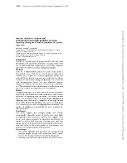Socioeconomic and health predictors for food insecurity during the COVID-19 pandemic in Czechia

Autor
Vávra, Jan
The European Public Health (EPH) Conference Foundation and the European Public Health Association (EUPHA)
Datum vydání
2023Publikováno v
European Journal of Public HealthNakladatel / Místo vydání
Oxford University Press (Oxford)Ročník / Číslo vydání
33 (Supplement_2)ISBN / ISSN
ISSN: 1101-1262ISBN / ISSN
eISSN: 1464-360XMetadata
Zobrazit celý záznamKolekce
Tato publikace má vydavatelskou verzi s DOI 10.1093/eurpub/ckad160.1082
Abstrakt
COVID-19 impacted people disproportionately and exacerbated preexisting social and health inequalities. The aim of this study was to understand how socioeconomic and health condition affected food security in Czechia during the pandemic.Methods:Data on a representative panel of Czech adults from a longitudinal survey, Life During the Pandemic collected in October 2022 as part of a Czech longitudinal survey were analyzed. Binary logistic regression as performed to evaluate whether food insecurity during the pandemic was associated with socioeconomic factors (sex, age, education, income, number of children) and health factors (BMI and comorbidity). The association between food insecurity and growing own food such as fruits and vegetables was also explored.Results:Younger people aged 20-34 years, lower education attainment, and people with underlying health condition(s) had a higher likelihood of reporting food insecurity. The lowest income group was associated with a 13 times higher likelihood of reporting food insecurity as compared to the high income group (95% CI 6.55, 27.44). Those who grew own food had a 37% decrease in the odds of reporting food insecurity. The number of children in a household was not a predictor for food insecurity.Conclusions:Our study suggests that younger people and socially, economically vulnerable groups of people were more likely to experience food insecurity. Policies that support these groups and reduce inequality in education and income are needed to reduce food insecurity. Growing own food may reduce impacts of food insecurity. Encouraging people to grow own food either in their own garden or in allotments may prepare us for unprecedented food insecurity.
Klíčová slova
socioeconomic inequality, health, food insecurity, COVID-19, pandemic, Czechia
Trvalý odkaz
https://hdl.handle.net/20.500.14178/2826Licence
Licence pro užití plného textu výsledku: Creative Commons Uveďte původ-Neužívejte dílo komerčně 4.0 International




